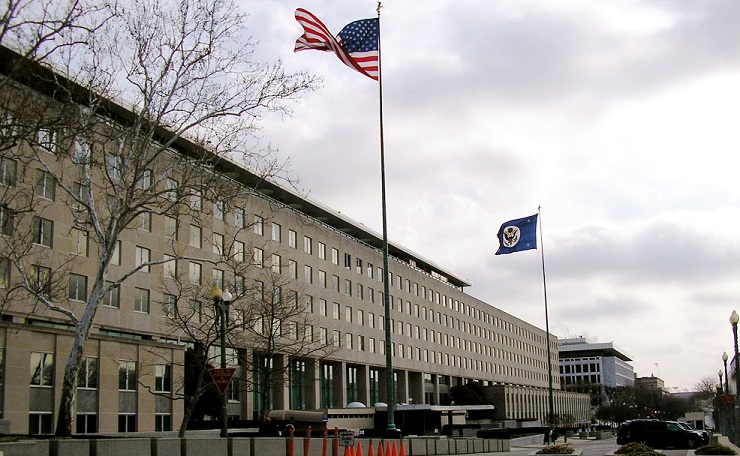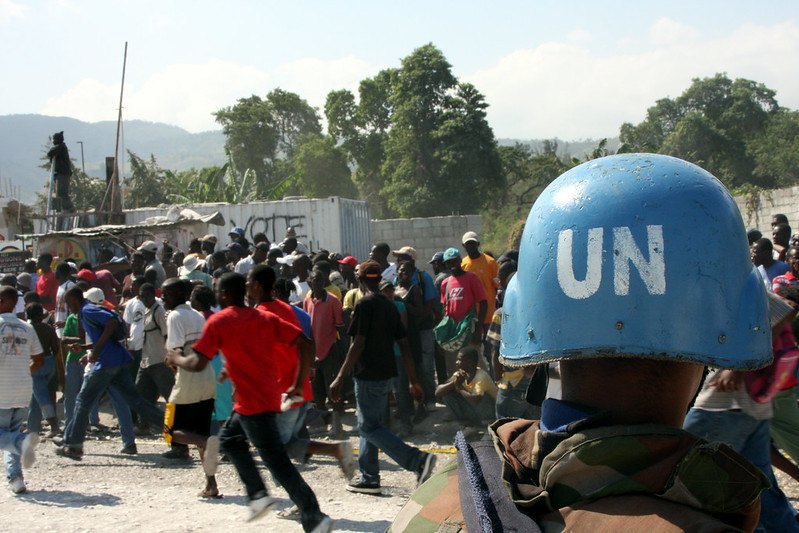The International Religious Freedom Act: A Primer
The new year has not, so far, seemed to have brought with it a new zenith for U.S.-Pakistan relations. On Jan. 1, President Donald Trump tweeted that Pakistan has offered “nothing but lies & deceit” in exchange for American aid, and “give[s] safe haven to the terrorists we hunt in Afghanistan, with little help.” Soon after, on Jan.

The new year has not, so far, seemed to have brought with it a new zenith for U.S.-Pakistan relations. On Jan. 1, President Donald Trump tweeted that Pakistan has offered “nothing but lies & deceit” in exchange for American aid, and “give[s] safe haven to the terrorists we hunt in Afghanistan, with little help.” Soon after, on Jan. 4, the State Department announced that it would be suspending most of its security assistance funding to Pakistan in a move that had been foreshadowed for months. While a specific amount has not been determined, up to $1.3 billion in annual aid could be affected. In response, Pakistan’s foreign minister, Khawaja Muhammad Asif, told the Wall Street Journal that Pakistan does “not have any alliance” with the U.S.
On the same day that the State Department suspended aid, it also placed Pakistan on a “Special Watch List” (SWL) of countries that “have engaged in or tolerated severe violations of religious freedom.” This designation is the product of the International Religious Freedom Act of 1998 (IRFA), as amended by the Frank R. Wolf International Religious Freedom Act of 2016. While the SWL designation does not automatically come with serious penalties, the IRFA does empower the president to punish countries through a range of political and financial means and previous administrations have done so. As such, while U.S.-Pakistan relations appear to unravel, it is important to understand the importance of Pakistan’s SWL designation as well as the powers Congress has already delegated to Trump under the IRFA.
The IRFA
In 1996, Secretary of State Warren Christopher convened the Advisory Committee on Religious Freedom Abroad to explore ways to “integrate religious freedom initiatives into U.S. foreign policy.” Over the next two years, Congress, in conjunction with the White House, worked through possible legislative means of accomplishing this goal. One such bill, the Freedom From Religious Persecution Act of 1997, most notably required automatic sanctions for countries found to have violated religious freedom norms. But the Clinton administration opposed this bill as a “blunt instrument” that would undermine broader foreign policy goals, ultimately doing more harm than good. After certain revisions, including a waiver provision for circumstances in the “national interest,” the IRFA passed in 1998 and was signed into law by President Bill Clinton.
The IRFA requires both the president and Congress to consider issues of religious freedom and persecution in American foreign policy. It accordingly requires the president to submit an annual report to Congress that covers “the status of religious freedom in each foreign country, violations of religious freedom by foreign governments, and United States' actions and policies in support of religious freedom.”
The president is also required to annually designate any countries that have “engaged in or tolerated systematic, ongoing and egregious violations of religious freedom” as “Countries of Particular Concern” (CPC). To facilitate these obligations, the Act established an Office of International Religious Freedom inside the State Department. It also created an Ambassador at Large for International Religious Freedom who, after being appointed by the president and confirmed by the Senate, would work to “advance the right to freedom of religion abroad, denounce the violation of that right, and recommend responses by the United States.” Since the first year of Act’s implementation in 1999, presidents have delegated their responsibilities under the IRFA to the secretary of state.
The IRFA was amended in 2016 by the Frank R. Wolf International Religious Freedom Act. The bill, among other things, expanded the scope of the IRFA to certain nonstate actors, increased the role of the Ambassador at Large, and extended the Act’s protections to non-theists. (For a more detailed summary, see the relevant section of the Commission on International Religious Freedom’s 2017 Annual Report.)
Presidential Actions
The core of the IRFA is Title IV, which outlines actions the president is required to take in light of violations of religious freedom abroad. When a transgressing country is identified—be it by the Annual Report and/or a CPC designation—the president (through the secretary of state) must choose from a list of fifteen “presidential actions” laid out in the Act. For countries found to violate religious freedom, but not with the severity required to become a CPC, the president has maximum flexibility. Under IRFA, “the President shall oppose such violations and promote the right of freedom of religion in that country” through any of the “presidential actions” named by the statute. The full list in §405(a) contains a number of limited options, such as a “private demarche” or the delay of a cultural exchange, and the president is also allowed to take any “commensurate” action to satisfy his obligations.
But for countries that commit “particularly severe” violations of religious freedom—that is, “systemic, ongoing, egregious violations of religious freedom”—and garner a CPC designation, the president’s discretion is cabined to the seven more punitive “presidential actions” provided for in the statute. They are: (1) withdrawing, limiting, or suspending development assistance, (2) prohibiting extensions of credit under OPIC or the Export-Import Bank, (3) withdrawing, limiting, or suspending security assistance, (4) curbing certain loans under the International Financial Institutions Act of 1977, (5) prohibiting agencies from issuing or approving exports of certain goods or technologies, (6) barring U.S. financial institutions from making loans above $10 million for a year, and (7) prohibiting the federal government from entering into a contract with the relevant country.
In practice, IRFA enforcement against CPCs has been critiqued as lackluster. A central reason for this is that the IRFA contains two main discretionary off-ramps that allow the president to avoid taking additional action. First, the president may “waive the requirement of taking action to advance IRFA’s purposes or the national interests of the United States.” Second, he may opt for “commensurate action,” —through a process labeled “double-hatting”—namely using pre-existing sanctions to satisfy any obligations under the IRFA. These options are used in the vast majority of situations. For instance, the Commission on International Religious Freedom, a bipartisan federal commission created by the IRFA, found that the regular practice of double-hatting or indefinite waivers has “provided little incentive for CPC-designated governments to reduce or halt egregious religious freedom violations.” (For a similar critique, see here.)
But the IRFA has also provided independent grounds for punitive actions in the past. In 2005, the Bush administration issued sanctions specific to religious freedom in response to Eritrea’s CPC designation. Additionally, in 2016, the Obama administration maintained the unilateral arms embargo on Burma to comply with the IRFA, even though the president has issued an executive order lifting all U.S. economic and financial sanctions on the country.
Lastly, as may be expected with congressional requirements on the president in foreign affairs, the IRFA has implicated certain separation of powers concerns. In particular, Section 403 of the Act requires the president to consult with the targeted country before taking any of the listed “presidential actions” and to report back to Congress. In his signing statement, Clinton explained that such provisions would be treated as “precatory,” finding that such a command “infringe[s] on the authority vested by the Constitution solely with the President” and thus would be “construe[d] in light of [his] constitutional responsibilities to conduct foreign affairs, including, where appropriate, the protection of diplomatic communications.”
Pakistan
Ten nations are currently listed as CPCs due to severe violations of religious freedom: Burma, China, Eritrea, Iran, North Korea, Sudan, Saudi Arabia, Tajikistan, Turkmenistan and Uzbekistan. This list has not, however, been updated. For instance, Iraq was part of the original list of CPCs in 1999, but removed in 2004. But most CPCs have been on the list for at least a decade: Burma, China, Iran and Sudan have been on since 1999; North Korea since 2003; Eritrea and Saudi Arabia since 2004; and Uzbekistan since 2006.
Pakistan has never been listed as a CPC and remains off the list today. Instead, the Trump administration placed the country on its “Special Watch List,” which is a new designation created by the Frank R. Wolf Act that applies to countries who do not meet all of the CPC criteria, but nonetheless have committed severe violations of religious freedom. (Pakistan is currently the only country on the SWL.) And because Pakistan is not formally listed as a CPC, the Trump administration is not required by the IRFA to take one of the more punitive actions noted above (or take a commensurate action or issue a waiver). As such, the IRFA could be satisfied through the kind of milder steps (e.g. “private demarche”) noted above. But for any country that is found to “engage[] in or tolerate[] violations of religious freedom,” the president is empowered to take “one or more” of any of the “presidential actions” described by the statute. Thus, the Trump administration may select from any of the 15 actions, including those more punitive.
Pakistan’s introduction to IRFA scrutiny—and its place on the newly used SWL—coincides with the administration’s increased willingness to use “foreign aid cuts as a foreign policy tool.” In that light, while the IRFA has so far largely served an information-forcing role in practice, Pakistan’s designation may mark the beginning of a more robust use of the statute. At minimum, the IRFA is another source of existing, shelf-ready powers delegated by Congress to the president to take unilateral action against certain countries.



.jpg?sfvrsn=3f72484e_5)
.jpg?sfvrsn=104df884_5)
